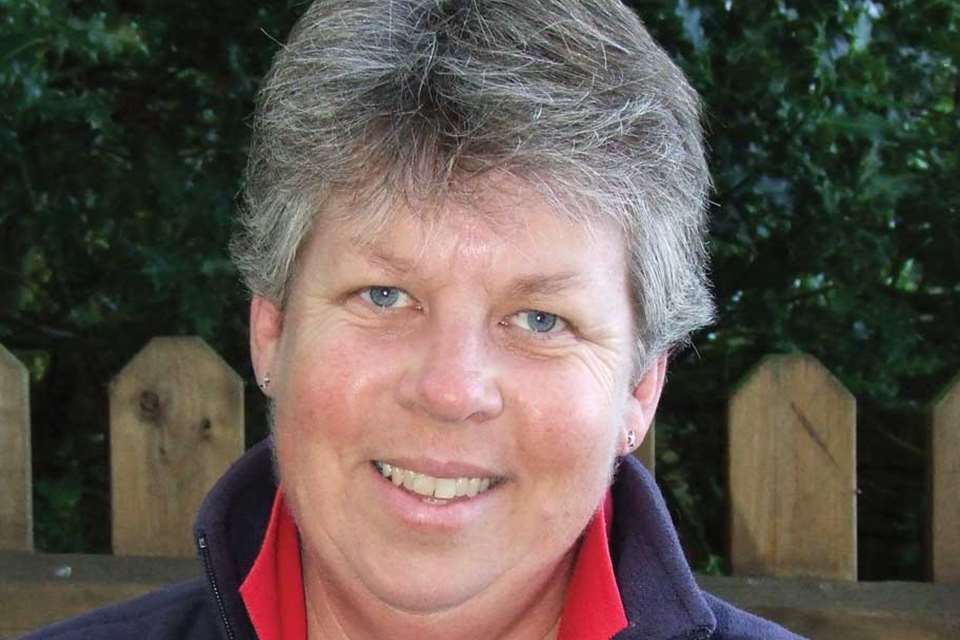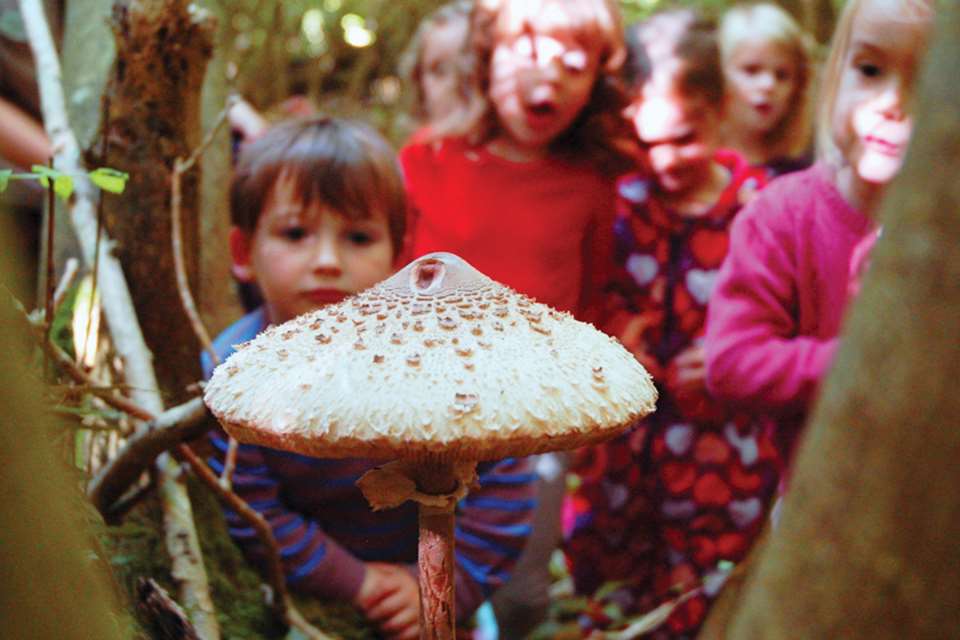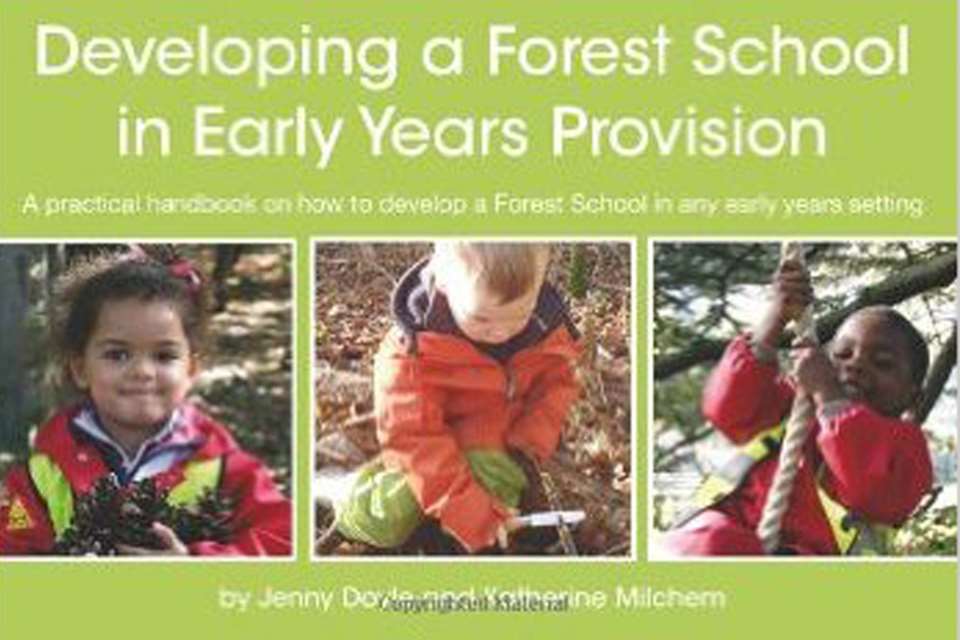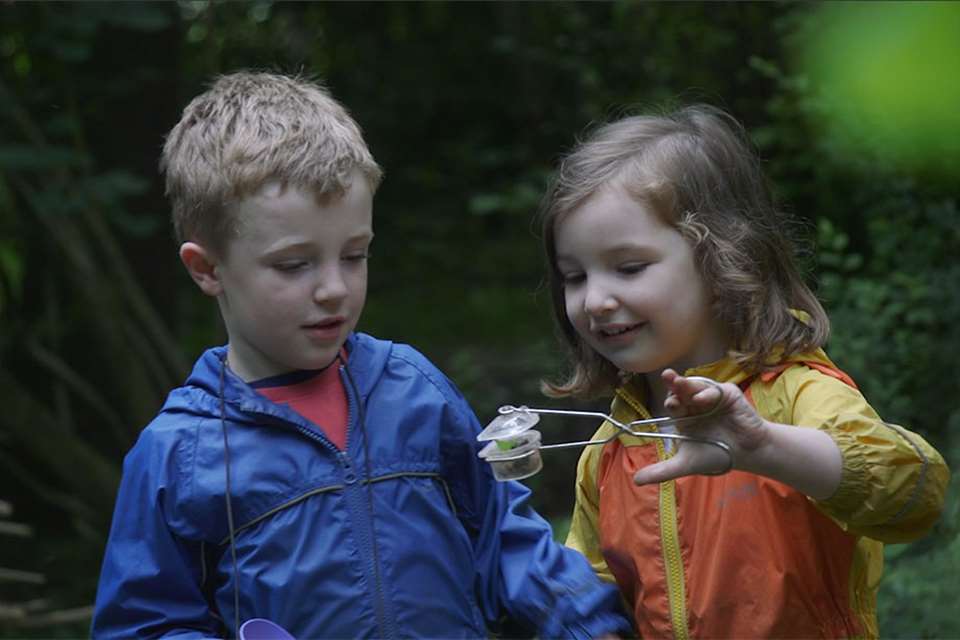Enabling Environments: Outdoors - Speak Out
Nicole Weinstein
Monday, March 5, 2018
Being in the woods is boosting children's language skills at oneof West Sussex's first early years settings to be awarded a national accreditation for the provision of Forest School. Nicole Weinstein reports

Download the PDF of Outdoors - Speak Out
Children at St Mary’s Pre-School in Horsham, West Sussex are finding that there is no better place to have a chat than up a tree. There, with a new perspective on the world and a new-found confidence that comes with having climbed a tree, children are happy to open up to practitioners about their home life, what they like and what they get up to in their spare time.
Over the past two years, St Mary’s Forest School leader, Liz Miles, has been running weekly three-hour sessions for every child in the academic year before starting school. In that time, she says, the two most significant observations have been children’s ‘growth in confidence in speech’ and the development of interactive play among children who previously played alone.
Climbing trees is just one of the many activities that have benefited the children, but it is one of the best. ‘It’s as if standing high in a tree and looking down on the world unleashes some kind of freedom in some children – and makes them feel elated,’ says Ms Miles.
‘Others might discover they can master the skill of sawing, drilling or fire-lighting – and this gives them a great sense of achievement.’ Ms Miles, who trained with Sussex Wildlife Trust, was instrumental in helping the pre-school become one of the first early years settings in the UK to be awarded Recognised Provider Status by the Forest School Association (FSA) (see box below).
COLLABORATIVE PLAY
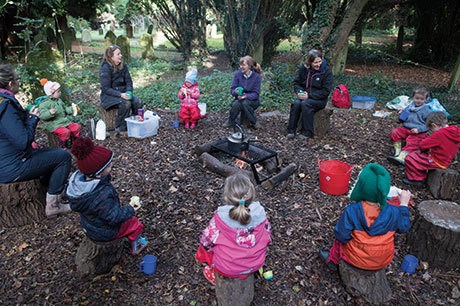
Sessions take place in a wooded area close to the pre-school building. There is a central base with a camp fire and tree stumps encircling it, which is used for snack times and group sessions. Snacks such as bannock bread, pancakes, soup, sausages and even pizza are cooked on the camp fire and the children are involved in the preparation and cooking.
During these times, when they sit together, the children often reflect on what they have done in the session and what they enjoyed the most.
‘We noticed that children who would not have said anything in a group situation in our main setting were speaking up and generally sounding enthused about their
discoveries,’ says Ms Miles. This was also apparent when they were taking part in unstructured Forest School activities, such as climbing trees (right), working with tools and lighting a fire.
This was also apparent when they were taking part in unstructured Forest School activities, such as climbing trees (right), working with tools and lighting a fire.
‘A lot of collaborative play takes place during the sessions,’ continues Ms Miles. When working with tools – bowsaws, hand drills, bit and brace drills, vegetable peelers (for whittling) – children need to listen carefully to instructions and work together. For example, when sawing, one or more children hold the wood while another saws, all the time communicating with each other about what they need to do, and learning new vocabulary. 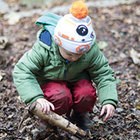 Ms Miles explains, ‘Activities such as this are highly motivating and challenging. Achieving their goals gives children a sense of pride which is often expressed verbally, and builds confidence. If a child feels good about themselves they are more likely to offer and share their thoughts and ideas.’
Ms Miles explains, ‘Activities such as this are highly motivating and challenging. Achieving their goals gives children a sense of pride which is often expressed verbally, and builds confidence. If a child feels good about themselves they are more likely to offer and share their thoughts and ideas.’
FEEDING THE IMAGINATION
Without access to the prescriptive toys of the indoor setting, practitioners find that the children’s creativity is unleashed, as they make use of the natural resources around them to
create props for their role play or tools to fulfil a particular function.
For example, children created a ‘wedding’ in a church built with branches. The bride made herself a dress out of ferns and a headdress of twisted ivy, and nettle crisps were served at the reception.
Den-building is another activity which involves children working together imaginatively. ‘We recently observed the building of a ship,’ recalls Ms Miles. ‘Some children collected the sticks, others put the sticks in place, another painted the sticks with muddy water and others made a fire and food to cook on it, all the while discussing what they were doing, negotiating with each other and talking about how to solve particular problems.
‘During this activity, the children accepted each other doing the role he or she had chosen and felt valued in fulfilling their own role. The ongoing nature of the sessions means that the children return each week with the confidence to join in a ship game, telling each other what they need and fetching it.’
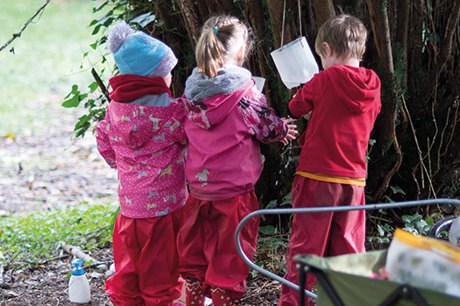
Handwashing in the forest
MANAGING RISK
Not only does the woodland environment provide a wide variety of learning opportunities, but the small group sizes and high adult-to-child ratios – four adults for every eight to 10 children – mean that these opportunities can be fully exploited.
Children are able to take part in activities that contain an element of risk such as lighting fires or climbing trees, so pushing them out of their comfort zone and giving them a sense of achievement and pride. This, in turn, builds confidence and self-esteem, while enabling the children to learn to manage risk for themselves – an important skill for life.
‘We get down to the child’s level and give them plenty of time to respond, trying not to ask too many questions,’ explains Ms Miles. ‘Children are always given time to talk and share throughout the session. The long-term nature of Forest School means that these rituals become embedded and children know what is coming. At the end of the session we sing a “thank you” song where the children decide what we will say thank you for today. They’re always ready with their ideas for this song. We use many songs, rhymes, books, games and sign language to reinforce language, and activities are repeated and extended.’
Practitioners also use visual prompts to support understanding. For example, with safety rules, they tell the children that they must not go in the fire circle, and they play games and sing songs to practise going around the outside and within the boundaries.
Central to their practice is following the children’s interests, to support their speech and extend their vocabulary through discovery – for example, finding bugs and using ID guides to learn their names and find out more about them.
Areas of particular interest are followed up in the nursery and explored further, incorporating the use of technology, books, art and craft, so continuing to support and extend the development of children’s speech and language.
If staff identify a particular activity, or other trigger, that has encouraged a child to speak, this will be developed across both Forest School and the setting, and shared with parents so they can continue supporting the child’s interest at home.
CASE STUDY
Eddy, aged four, has severe speech and language delay, lacks focus on activities inside the setting, has social and communication difficulties and mostly plays on his own, rarely engaging with other children.
At Forest School, he really enjoys the practical activities such as sawing and fire-lighting and he is good at them, making sparks easily where others struggle. This has boosted his confidence and elicited speech – ‘Did it!’
He began to help other children, showing them what to do and encouraging them physically by clapping and also verbally – saying ‘Look!’ and ‘Yay!’ – which helped him to build relationships with them. He went on to join in stick play and den-building.
After attending for a while he began talking to his mother and keyworker at pre-school about his Forest School experiences, using vocabulary they had not heard before. He was also observed to be more focused on activities indoors as well as engaging more with other children. Forest School has offered him an alternative learning environment that may suit his needs better.
OUR OUTDOOR TIPS
Ms Miles says, ‘We use bowsaws, hand drills, bit and brace drills, vegetable peelers (for whittling), short-handled loppers, fire steels, fire kettle and grill, fire bucket and blanket, fire gloves and rigger gloves for tool use.’
Some of the pre-school’s regular suppliers include:
www.muddyfaces.co.uk
www.greenmanbushcraft.co.uk
www.muddypuddles.com – for waterproof clothing; discounts for schools and nurseries are available.
MORE INFORMATION
- www.stmaryspreschoolhorsham.co.uk and www.facebook.com/Stmarysnurseryhorsham.
- www.forestschoolassociation.org
- FSA Sussex is a local group for Forest School practitioners, offering support, networking, skills sharing and CPD days. www.facebook.com/groups/164679850266354.
- https://sussexwildlifetrust.org.uk/what-we-do/environmental-education/forest-school/forest-school-training
IN RECOGNITION
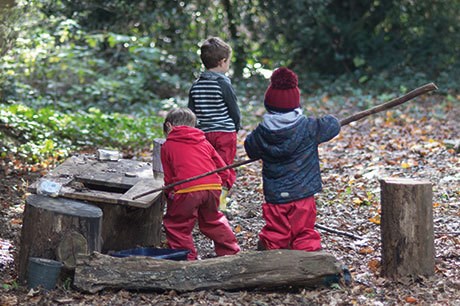
The Forest School Association, the professional body and UK-wide voice for Forest School, awarded St Mary’s Pre-School the status of Recognised Forest School Provider after it went through a rigorous evidence-based assessment process to demonstrate that its practice operates in line with the six principles of Forest School good practice.
Forest School:
1. ?is a long-term process of frequent and regular sessions in a woodland or natural environment, rather than a one-off visit; planning, adaptation, observations and reviewing are integral elements
2. ?takes place in a woodland or natural wooded environment to support the development of a relationship between the learner and the natural world
3. ?aims to promote the holistic development of all those involved, fostering resilient, confident, independent and creative learners
4. ?offers learners the opportunity to take supported risks appropriate to the environment and to themselves
5. ?is run by qualified Forest School practitioners who continuously maintain and develop their professional practice
6. ?uses a range of learner-centred processes to create
a community for development and learning.
The assessment included evidence practitioners have the relevant qualifications, first-aid certificates and risk assessment processes in place to run the sessions safely, as well as detailed session plans showing evaluation, reflection, next steps and progression for children.
It costs £100 per year to be a recognised provider, but this comes with various benefits, including discounts on insurance premiums and appearing on a map.


